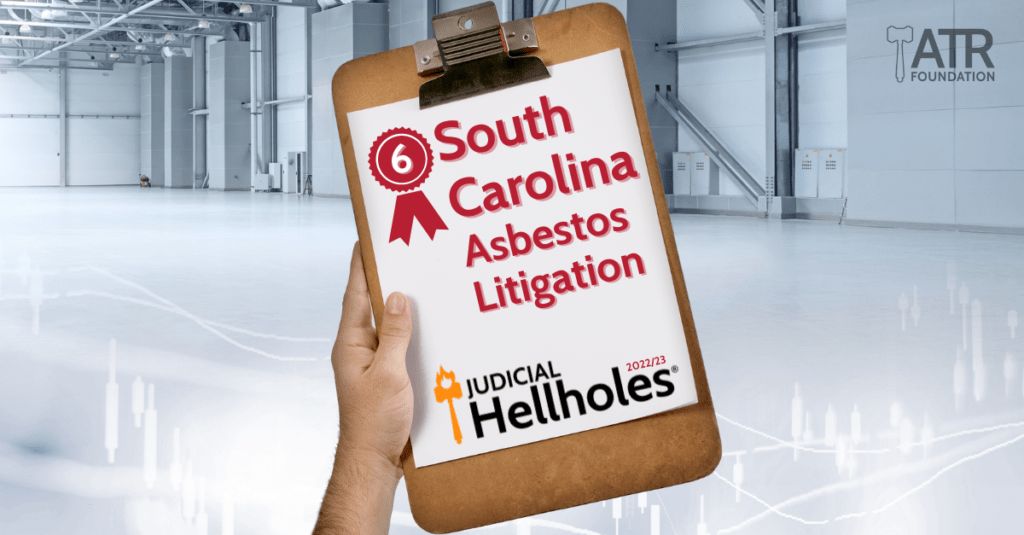‘Highly Unusual’ Rehearing of Louisiana Case Raises Judicial Independence Concerns
Louisiana Supreme Court Waffles Under Political Pressure, ATRA Brief Urges Court to Stand Strong

Problematic case proceedings make the state’s asbestos docket one of the worst in the country
South Carolina’s asbestos litigation was included among the worst “Judicial Hellholes®” in the nation today, according to a new report from the American Tort Reform Foundation (ATRF). This is the third consecutive year the state’s asbestos docket has made the list.
ATRF’s report says South Carolina’s asbestos litigation has developed a reputation for bias against defendants, unwarranted sanctions, low evidentiary requirements, liability-expanding rulings, unfair trials, severe verdicts, and a willingness to overturn or modify jury verdicts to benefit plaintiffs.
“With Judge Jean Hoefer Toal at the helm of South Carolina’s asbestos docket, the state has built a record of plaintiff-friendly rulings, overturning or modifying jury verdicts with which the court disagrees, and consolidating vastly different cases,” American Tort Reform Association President Tiger Joyce said.
Now, the South Carolina Court of Appeals has affirmed some of Judge Toal’s expansive rulings, which ATRF says were missed opportunities to keep the state in the mainstream and further contributing to the state’s reputation as an outlier in its handling of asbestos cases.
While nationally, asbestos claims are down overall in recent years, filings in South Carolina have risen dramatically due in part to the activity of out-of-state law firms who are privy to South Carolina’s pro-plaintiff ways.
Texas trial lawyers from the Law Offices of Dean, Omar, Branham and Shirley and their local counsel Kassel McVey are very active in South Carolina’s asbestos docket, and tend to find favor with Judge Toal.
“The Dean Omar firm routinely demands overbroad discovery in conjunction with corporate defendant depositions, in which businesses are required to turn over what they believe are excessive, irrelevant, and often impossible to produce documents,” Joyce said.
In two recent cases, the South Carolina Court of Appeals made the state even more of an outlier in asbestos litigation when it affirmed verdicts based on controversial theories about asbestos exposure.
“The state’s appellate court could rein in Judge Toal and restore some fairness and balance to asbestos litigation in the state, but instead, they’re making the situation even worse,” Joyce said. “Unfortunately, the decision likely will only further embolden the plaintiffs’ bar.”
ATRF’s report says that according to national asbestos attorneys, South Carolina courts’ discovery orders are more frequent, broader, and the sanctions more severe than in any other jurisdiction.
The 2022-2023 Judicial Hellholes® report further discusses the issues with the “cumulative dose” theory often used in South Carolina asbestos cases, the court’s record of overturning and changing verdicts with which it disagrees, and a $32 million nuclear verdict as contributing factors to their ranking.
The 21st edition of the annual report published by ATRF names eight Judicial Hellholes® in total, deemed the most unjust local courts and state civil justice systems in the country:
The full report is available at JudicialHellholes.org.
Louisiana Supreme Court Waffles Under Political Pressure, ATRA Brief Urges Court to Stand Strong
Left unchecked, these jurisdictions will continue dragging down economic growth and undermining justice through rampant lawsuit abuse.
Claimants Given Opportunity to Vote on Plan; Judge to Reconsider Scientific Validity of Plaintiffs’ Experts
Legitimate consumer protection demands sound science and impartial analysis — not distorted data designed to manufacture lawsuits.
Law Firms Spent $168M+ on 2.2M Ads in Georgia
ATRA’s Latest Studies Reveal Financial Influence and Lack of Transparency in Pennsylvania’s Campaign Finance Systems